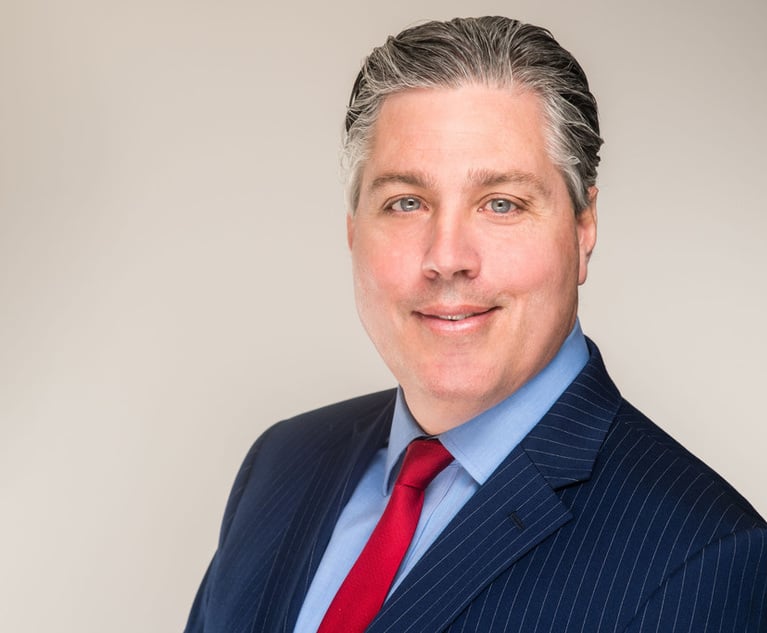Immunity for Pa. Judicial System, $21M Bad Faith and Possible Discipline for Frank Fina Top SCOPA's Argument List
The justices are scheduled to hold a three-day argument session in Harrisburg beginning Tuesday. The high court is set to hear arguments in 21 cases.
November 14, 2019 at 03:17 PM
6 minute read
 Pennsylvania State Capitol building in Harrisburg. Photo: Shutterstock
Pennsylvania State Capitol building in Harrisburg. Photo: Shutterstock
The Pennsylvania Supreme Court is set to consider several high-profile issues during its argument session, including whether the Unified Judicial System should be immune from employment lawsuits, whether former prosecutor Frank Fina should be disciplined for his role as an investigator in the Jerry Sandusky child sex-abuse case and whether the Superior Court properly tossed a $21 million bad-faith award.
The justices are scheduled to hold a three-day argument session in Harrisburg beginning Tuesday. The high court is set to hear arguments in 21 cases.
Several of the cases are set to focus on the Pennsylvania Human Relations Act. On Tuesday, the court is expected to hear argument in Harrison v. Health Network Laboratories to consider whether the PHRA and its administrative procedures are the exclusive remedy for discrimination claims brought under the state's whistleblower law, and, on Thursday, the justices are set to consider whether the Unified Judicial System falls under the definition of "employer" under the PHRA, which would do away with the court system's sovereign immunity.
That question is set to be addressed in the case Renner v. Court of Common Pleas of Lehigh County. Part of the arguments in that case are also expected to focus on whether applying the PHRA to the UJS violates the separation of powers doctrine.
According to court documents, the case stems from Lehigh County parole officer Michael Renner's allegations that he was subjected to a hostile work environment and eventually fired after taking a medical leave. Renner, court documents said, then became a police officer, but, he alleged that the court continued to interfere with his employment, including barring him from carrying a gun or taser in the court and providing false and misleading job references.
Renner sued the court, but the trial court dismissed the case at the preliminary objections stage. The ruling was appealed to the Commonwealth Court, which issued a per curiam order in October 2018. The appeals court ultimately relied on the Supreme Court's 1999 decision in First Judicial District of Pennsylvania v. Pennsylvania Human Relations Commission, to determine that "because the Common Pleas court is a part of the judiciary, it is not subject to the PHRA."
$21M Bad Faith
On Thursday, the Supreme Court is set to hear arguments over a high-profile $21 million verdict that was tossed out by the state Superior Court twice.
The justices took up the case to address several issues, including whether the Superior Court improperly reweighed evidence under standards outlined in Rancosky v. Washington National Insurance.
The case arose after plaintiffs, Daniel and Sheryl Berg, took their damaged 1996 Jeep Grand Cherokee to a facility participating in the insurer's "Blue Ribbon Repair Program," where one appraiser recommended that the vehicle be totaled. The Bergs, however, alleged that Nationwide Mutual Insurance reversed that appraisal without informing them and then ordered the vehicle sent to another repair facility. After allegedly finding problems with the car, the Bergs argued that, despite the attempted repairs, Nationwide knowingly returned them their vehicle with an unsound structural frame in order to avoid paying for a new vehicle.
After a jury found Nationwide violated the Unfair Trade Practices and Consumer Protection Law, the trial judge granted a directed verdict for Nationwide, but the Superior Court eventually reversed, giving the plaintiffs another chance to try their bad-faith claims. In June 2014, Berks County Court of Common Pleas Judge Jeffrey Sprecher issued his $21 million bad-faith verdict, along with a lengthy and scathing opinion, finding that "Nationwide strong-armed its own policyholder rather than negotiating in good faith to compensate plaintiff for the loss suffered in the automobile collision."
The Superior Court eventually reversed and entered judgment for the defendant on the bad-faith claims.
UC Benefits for 'Self-Employment'
In A Special Touch v. Department of Labor and Industry, the justices are set to hear argument over what constitutes "self-employment" for the purposes of the Unemployment Compensation Law, which does not explicitly define the term.
The justices took up the case in May to examine a single issue, as phrased by the defendant-petitioner: "Should this court exercise its supervision to provide the controlling interpretation of the phrase 'customarily engaged in an independent business' to define 'employment' in the Unemployment Compensation Law in order to resolve the inconsistent interpretations of the Commonwealth Court as to a definition that is fundamental to the administration of the [Unemployment Compensation] program and thus of significant public importance?"
Last August, a three-judge panel of the Commonwealth Court ruled 2-1 to reverse an adjudication of the Department of Labor & Industry that imposed an unemployment compensation tax on plaintiff beauty salon A Special Touch for five people who worked there in various positions, including some who worked as nail technicians and others who performed janitorial, laundry and babysitting services. The department had labeled those five individuals as employees, while classifying another five people who worked at the salon in similar positions as independent contractors.
The Commonwealth Court majority, however, said the unemployment compensation tax should not have applied to any of those 10 people because all were "customarily engaged in an independently established trade, occupation, profession or business" under Section 4(l)(2)(B) of the Unemployment Compensation Law.
Frank Fina Discipline
In June, the Disciplinary Board recommended that Fina, a former assistant attorney general, should be suspended for one year plus one day for his role in investigating three former Pennsylvania State University administrators over their handling of the Sandusky scandal.
The disciplinary charges against Fina stem from an October 2012 hearing into whether state prosecutors could call Penn State's former general counsel Cynthia Baldwin to testify before an investigating grand jury. Baldwin had appeared before the investigating grand jury when the former university officials, Tim Curley, Gary Schultz and Graham Spanier, had testified.
Specifically, disciplinary counsel argued that Fina misled Judge Barry Feudale, who was overseeing the grand jury, in the hopes of gaining the judge's approval to question Baldwin.
The justices are expected to hear arguments about the recommended discipline Thursday.
This content has been archived. It is available through our partners, LexisNexis® and Bloomberg Law.
To view this content, please continue to their sites.
Not a Lexis Subscriber?
Subscribe Now
Not a Bloomberg Law Subscriber?
Subscribe Now
NOT FOR REPRINT
© 2025 ALM Global, LLC, All Rights Reserved. Request academic re-use from www.copyright.com. All other uses, submit a request to [email protected]. For more information visit Asset & Logo Licensing.
You Might Like
View All
Saul Ewing Loses Two Partners to Fox Rothschild, Marking Four Fla. Partner Exits in Last 13 Months
3 minute read


Feasting, Pledging, and Wagering, Philly Attorneys Prepare for Super Bowl
3 minute readTrending Stories
- 1Connecticut Movers: New Laterals, Expanding Teams
- 2Eliminating Judicial Exceptions: The Promise of the Patent Eligibility Restoration Act
- 3AI in Legal: Disruptive Potential and Practical Realities
- 4One Court’s Opinion on Successfully Bankruptcy Proofing a Borrower
- 5Making the Case for Workflow Automation
Who Got The Work
J. Brugh Lower of Gibbons has entered an appearance for industrial equipment supplier Devco Corporation in a pending trademark infringement lawsuit. The suit, accusing the defendant of selling knock-off Graco products, was filed Dec. 18 in New Jersey District Court by Rivkin Radler on behalf of Graco Inc. and Graco Minnesota. The case, assigned to U.S. District Judge Zahid N. Quraishi, is 3:24-cv-11294, Graco Inc. et al v. Devco Corporation.
Who Got The Work
Rebecca Maller-Stein and Kent A. Yalowitz of Arnold & Porter Kaye Scholer have entered their appearances for Hanaco Venture Capital and its executives, Lior Prosor and David Frankel, in a pending securities lawsuit. The action, filed on Dec. 24 in New York Southern District Court by Zell, Aron & Co. on behalf of Goldeneye Advisors, accuses the defendants of negligently and fraudulently managing the plaintiff's $1 million investment. The case, assigned to U.S. District Judge Vernon S. Broderick, is 1:24-cv-09918, Goldeneye Advisors, LLC v. Hanaco Venture Capital, Ltd. et al.
Who Got The Work
Attorneys from A&O Shearman has stepped in as defense counsel for Toronto-Dominion Bank and other defendants in a pending securities class action. The suit, filed Dec. 11 in New York Southern District Court by Bleichmar Fonti & Auld, accuses the defendants of concealing the bank's 'pervasive' deficiencies in regards to its compliance with the Bank Secrecy Act and the quality of its anti-money laundering controls. The case, assigned to U.S. District Judge Arun Subramanian, is 1:24-cv-09445, Gonzalez v. The Toronto-Dominion Bank et al.
Who Got The Work
Crown Castle International, a Pennsylvania company providing shared communications infrastructure, has turned to Luke D. Wolf of Gordon Rees Scully Mansukhani to fend off a pending breach-of-contract lawsuit. The court action, filed Nov. 25 in Michigan Eastern District Court by Hooper Hathaway PC on behalf of The Town Residences LLC, accuses Crown Castle of failing to transfer approximately $30,000 in utility payments from T-Mobile in breach of a roof-top lease and assignment agreement. The case, assigned to U.S. District Judge Susan K. Declercq, is 2:24-cv-13131, The Town Residences LLC v. T-Mobile US, Inc. et al.
Who Got The Work
Wilfred P. Coronato and Daniel M. Schwartz of McCarter & English have stepped in as defense counsel to Electrolux Home Products Inc. in a pending product liability lawsuit. The court action, filed Nov. 26 in New York Eastern District Court by Poulos Lopiccolo PC and Nagel Rice LLP on behalf of David Stern, alleges that the defendant's refrigerators’ drawers and shelving repeatedly break and fall apart within months after purchase. The case, assigned to U.S. District Judge Joan M. Azrack, is 2:24-cv-08204, Stern v. Electrolux Home Products, Inc.
Featured Firms
Law Offices of Gary Martin Hays & Associates, P.C.
(470) 294-1674
Law Offices of Mark E. Salomone
(857) 444-6468
Smith & Hassler
(713) 739-1250





